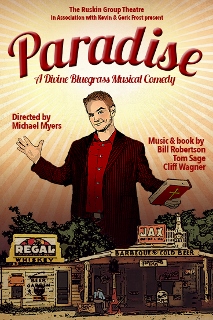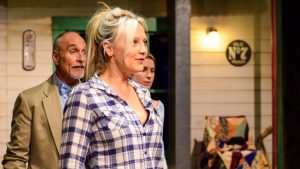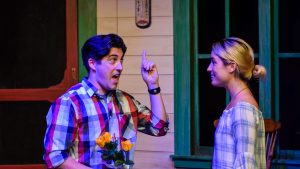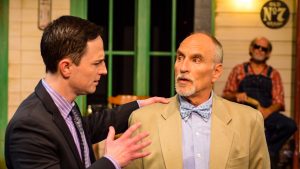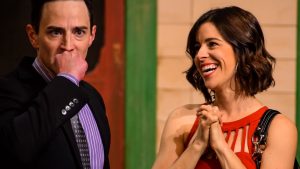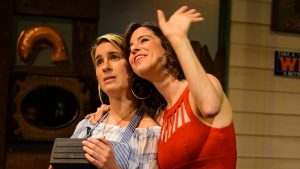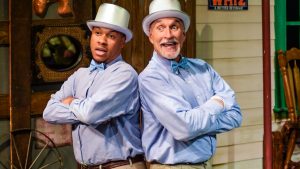THE ETERNAL SUNSHINE OF A FOR-PROFIT PROPHET
There are many pleasures on display in the newest incarnation of the bluegrass musical Paradise, which has been in development for over five years. Now at Ruskin Group Theatre, this is the third version I’ve seen in the show’s journey, and the most fully staged.
The story is deceptively simple: The tiny coal mining town of Paradise has hit disastrously hard times. The hope of salvation arrives with a smooth-talking preacher and a reality television show. Only one resident resists, and multiple personal stories are intertwined as the preacher shows himself to be far more dangerous — yet also, oddly, more endearing — than first imagined. The musical is amiable and sweetly funny, less satire than wry appreciation of the strange way we live now. It celebrates musical theater conventions while utilizing a non-traditional musical idiom, and the hybrid nature of what results is satisfying and successful.
As the mysterious preacher, Rev. John Cyrus Mountain, Broadway veteran Jon Root is just about perfect. He is vibrant and stays in the moment, relishing bits of business like a little quick step in the middle of his opening song (the very funny “Greater Than Thou”) and muttering under his breath as he tries different takes on some of the preacher’s big pronouncements.
Root is styled in the clean-cut mold of a congressional candidate, but he can turn on a dime, twinkling with a combination of glee and perversity. His magnetism is visceral and believable. In the second act, as the character’s back story emerges, Root adds a layer of sincerity and loss that the material doesn’t fully explore. I wish it did.
As Chastity Jones, the proverbial hooker with a heart of gold, Nina Brissey does a fantastic pole dance while singing “Jesus Is Deep Inside Me (and He Ain’t Pulling Out)” She lands her jokes without underlining them, bringing a realism and earthiness that serves the show well. Chip Bolcik is a hoot as the town’s closeted mayor. Though he has some of the broadest puns and jokes, he steers well clear of sketch comedy.
The rest of the cast also stays anchored and natural. We are dealing with three easily lampooned subjects — hillbillies, religion, and reality television — but director/producer Michael Myers isn’t interested in tawdry effects or cheap shots. He and choreographer Tor Campbell work wonders with a difficult space, creating a seamless flow of action.
I’ve always liked this project. I continue to believe that the creative team, Bill Robertson and Tom Sage (book/lyrics) and Cliff Wagner (book/music), have a winner on their hands that could go the distance and play in multiple productions across the country. Their development odyssey has involved some heavy hitters in the biz, and has done the show good. Yet there are some lingering effects of what I imagine were real differences about creative and commercial directions for the project.
Someone likely (and rightly) insisted that the team had to incorporate the specter of Trump, but there are too many references to him for my taste. The tone of the show is also sometimes uneven. Part of the appeal of bluegrass is how it feels human and real, never slick. The humor in Paradise plays best when it finds its own idiosyncratic rhythm.
The best comedy takes its characters’ motivations and desires very seriously. There are some big moments here that are given short shrift for the sake of expediency, especially with the narrative elements that lead the townspeople to agree to being on reality television. First, just about everyone is up for it, then, because there needs to be a plot dilemma, they turn against it, giving the preacher a chance to win them back. The one holdout, Louanne, changes her mind in the final song before intermission — because that’s what you do in musicals — but she never gets dialogue, lyrics, or action that makes her decision feel organic.
Louanne has lived all her life in Paradise and longs to escape. Her late mother is a constant presence for her. Yet in the stirring ballad “I Miss You” she repeatedly sings the line, “I have no regrets.” This is an instance of what I mean about needing to take the characters’ desires and inner lives seriously. No regrets? Louanne has nothing but regrets. Her regrets underscore every decision she makes in the show. Perhaps her fear of creating more regrets guides her choice to be on television.
There are other choices characters make, particularly about revealing secrets, that don’t always land right. All the necessary motivations are there — lurking around in the material waiting to be explored, sometimes referred to in off-hand lines or bits of business. It is just a question of taking the characters’ wants and needs seriously enough.
This is not to say that what results must be serious. One of my favorite moments in the show is a deranged song about lighting bags of shit on fire. The idea itself is funny enough, but it hits a home run because it is deeply wedded to the twisted psyche of Cyndi, the character singing it. Paige Segal plays Cyndi, a woman who has a petting zoo/taxidermy business. You feel the soft, furry little animals, and then you can take them home with you preserved forever. Genius.
photos by Michelle Hanzelova
poster design by Amelia Mulkey
Paradise – A Divine Bluegrass Musical Comedy
Ruskin Group Theatre
in association with Kevin and Geric Frost
3000 Airport Ave in Santa Monica
Fri and Sat at 8; Sun at 2
ends on September 23, 2018
for tickets, call 310.397.3244 or visit Ruskin
